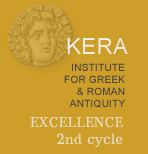Elmalı Yurt / Pırnaz
65. Epitaph of Hermaios and Oa(a?)
![]()
5 |
Ἑρμαῖος Σύρου ἀνέστησεν αἱαυ– τὸν ζωῶν καὶ τήν γυναίκα αὐτοῦ Οαα Ζωσίμηδος ζώοα |
Hermaios son of Syros set up (a statue of) himself while he lived, and his wife Oa daughter of Zosimes (?), while she lived.
Round funerary column, seen and documented in August 2004 in Elmalı Yurt, in the garden of Halil Bilgin. Mr. Bilgin found the stone in his field nearby. The stone is profiled at the top, with a niche containing a very worn relief. It depicts two figures, one of which appears to be reclining on a couch. The relief may therefore represent a funerary banquet. The bottom of the column appears to be broken and is partly buried in the ground.
Height: at least 76 cm; diameter: 37.5 cm; letters: 2-2.5 cm.
Unpublished
L. 1 : On Ἑρμαῖoς see no. 71. Σύρος is common in Pisidian Termessos. For more Greek personal names derived from ethnica see Bechtel 1917, pp. 536-546.
L. 2-3 : αἱαυτὸν stands for ἑαυτόν. The orthography and morphology of this text is as irregular as its lettering; cf. ζωῶν instead of ζῶν, Ζωσίμηδος instead of Ζωσίμιδος or Ζωσίμη (cf. below), ζώοα instead of ζῶσαν. On the accusative (ἀνέστησεν) ἑαυτόν see no. 35. On the expressions ζῶν, ζῶσα etc. see no. 39.
L. 4 : The letters OAA are clearly legible on the stone. This must be a variant of the female name Οα which is widespread in Termessos. Alternatively, the name of Hermaios' wife may have been Οα, and the second alpha on the stone is to be regarded a mason's error. In Cibyra a woman named Ουοα is attested (IK Kibyra I 302). On this and similar names see Milner 1998, pp. 13-14.
L. 5 : Ζωσίμηδος is either a misspelled or an irregular genitive, or both. If it is simply misspelled, and stands for Ζωσίμιδος, it belongs to the female name Ζωσίμης (unattested) or (LGPN). But it appears more likely that Ζωσίμηδος is an irregular genitive of a male name Ζωσίμης because if Oa(a) was a former slave or an illegitimate child whose father was unknown, that fact need not have been advertised on a monument raised by her husband; all the more so since it was apparently raised during the couple's lifetime. On the disappearance of the iota from male names ending in -ιος, thus producing names in -ις, see Brixhe 1987, pp. 49-50.

